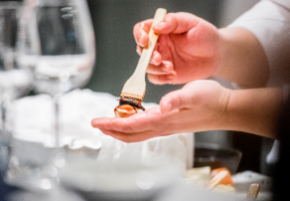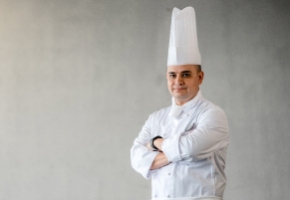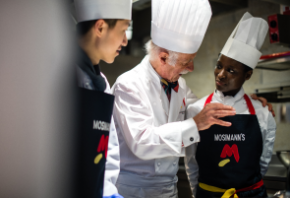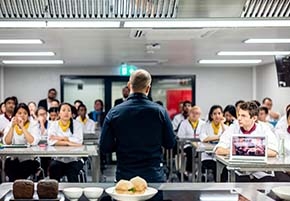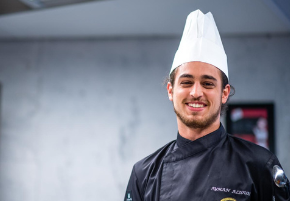- About
- Programs
- Campus Life
- Career Services
- Admissions
- News & Events
- Alumni
What Are Culinary Arts? Education, Skills, and Career Paths
Discover what culinary arts are, the skills you need, and how Culinary Arts Academy Switzerland (CAAS) can help you launch your culinary career.
Key Takeaways
- Culinary arts is the field of study and practice focused on preparing, cooking, and presenting food professionally.
- Culinary Arts Academy Switzerland (CAAS) is one of the world's leading culinary schools, ranked top in Switzerland and highly respected by both employers and academics.
- A degree in culinary arts centers on essential kitchen skills, food science knowledge, and the business tools to succeed in the food industry.
Food often brings people together—at the start of the day, during celebrations, or in moments of comfort. A familiar aroma or flavor can instantly reconnect someone with a powerful memory.
Beyond nourishment and taste, food carries personal and cultural significance. Creating meaningful dishes requires a chef to master a combination of techniques, creativity, and professional training in the culinary arts.
What Are Culinary Arts?
Culinary arts is the discipline of cooking and presenting food. The word “culinary” refers to anything related to the kitchen or cooking, while “arts” reflects the creativity and technique involved in transforming ingredients into dishes that carry meaning.
Culinary arts is also grounded in science. Understanding how heat changes the texture of meat, how yeast makes dough rise, or how acidity balances flavors are just some of the culinary activities that involve chemistry, biology, and even physics. In this way, a well-equipped kitchen becomes both a creative studio and a scientific lab.
Over centuries, food preparation has evolved from a survival-based necessity into an actual craft, a tradition, and eventually, a distinct field of study and profession.
Anyone who aspires to become a chef and climb up the kitchen hierarchy, open a restaurant, or drive innovation in the food industry needs more than talent and passion. Formal education provides the foundation—linking culinary techniques with business knowledge, scientific understanding, and leadership skills—that gives chefs the credibility and expertise to succeed.
Culinary Education: Why CAAS Is the Perfect Choice
Culinary Arts Academy Switzerland (CAAS) is the only culinary school to be ranked among the top 10 hospitality institutions worldwide in the 2025 QS World University Rankings. It also ranks seventh globally for employer reputation and fifth for academic reputation.
CAAS offers an array of culinary programs that are tailored to different areas and interests. These programs include:
Our students learn under the guidance of seasoned professionals, and as Huy, CAAS alumni, stated:
The chefs are all amazing; you feel comfortable asking any questions you have, and they all have so much knowledge.
Jet Lo, now head chef at one of Singapore's top restaurants, praised the teaching staff at CAAS—especially Chef Patrick Diethelm—for pushing him beyond his limits and teaching him "that the hallmarks of a great chef is one who is disciplined, has a strong grasp on the foundations of classical cooking, and one who maintains a well-organized kitchen."
That sense of rigor—demanding but ultimately transformative—is echoed by Malak, another CAAS alumna and now a chef herself, who looks back on her CAAS experience and states:
I especially appreciate the way the chefs taught us by putting us in high-pressure situations. They truly showed us how to survive in the real world. I’m not sure I would be able to survive in this industry if I didn't have the training I received.
In addition to the teaching staff, students also have the opportunity to gain insights from many other global culinary leaders through initiatives like the Distinguished Chef Series. This program invites world-renowned chefs to conduct guest lectures and collaborate with students on exclusive dinners that offer them first-hand exposure to international culinary excellence.
Among the many famous chefs associated with CAAS is Michelin Star Chef Anton Mosimann, OBE, a leading culinary icon who serves as the Honorary Dean. His illustrious career includes cooking for British royalty and global dignitaries.
Chef Mosimann's legacy is preserved in the Mosimann Collection at the Le Bouveret campus—a curated assembly of culinary artifacts, cookbooks, and personal memorabilia. He actively engages with students, offering mentorship and sharing his vast experience.
Thanks to everything CAAS offers—from structured academic programs to personal mentorship and unforgettable culinary moments—graduates earn diplomas, but more importantly, they gain the confidence to pursue successful and sustainable careers in the food industry.
As pastry chef Hannah Corado put it, "Being able to study at Culinary Arts Academy in Switzerland is where I learned the most about how a kitchen actually functions." Vinyaka, another CAAS alumna and Co-Founder and Executive Chef at Sweet Sugar Bakery, echoes this sentiment as she credits the school with helping her build confidence:
I have been given so many opportunities which helped build my confidence in the field I wanted to pursue and enabled me to successfully achieve my goal.
Must-Have Skills for Culinary Artists
Success in the culinary world depends on technical precision and creative flair. It's as much about understanding your tools and the techniques used as it is about applying that knowledge in ways that satisfy your customers.
Here are some key skills every culinary artist must have:
Knife skills
Kitchen knives are a chef's closest companion. From chopping and dicing to filleting and julienning, each knife has a specific role in the kitchen. Some are designed for speed and precision; others offer more control and safety. It all depends on the cut you need.
Many culinary students struggle with this at first—including Donya Modir, a CAAS alumna who admits, “I didn't know the difference between a chef knife and a deboning knife, for example; they all looked the same to me.” What helped her overcome that learning curve? “The focus each of our chefs—or I would say mentors—invested in us really made the difference.”
CAAS even provides students with a starter kit that includes many of the most important types of knives, so they have the tools they need from day one to begin developing their skills.
Cooking techniques
Probably the most obvious skill aspiring chefs must focus on is mastering cooking techniques. At CAAS, students spend half their study time in state-of-the-art kitchens practicing the fundamentals—roasting, grilling, boiling, baking, steaming, and frying—before progressing to more advanced methods like sous vide or even molecular gastronomy.
While learning how to cook is a must, the difference between a good cook and a chef lies in their ability to balance flavors, textures, and timing with precision. That's where the training offered at CAAS is most important.
Food safety and sustainability
Food safety always comes first. Culinary professionals must know how to store and prepare food properly to prevent contamination and maintain high hygiene standards.
Today, this responsibility extends to sustainability. Reducing food waste, sourcing local and seasonal produce, and making environmentally conscious choices are now a valuable aspect of modern kitchen operations. With advances in food technology, chefs now have more tools than ever to implement eco-friendly practices in their kitchens.
Food presentation
The visual presentation of a dish also plays a huge role in how the meal is received, especially in an era where food dominates our social media feeds.
At CAAS, food aesthetics is treated as seriously as taste. Students learn about the art of plating food, portioning, and color balance to elevate the entire meal and culinary experience.
Food service
Behind every great dish is a well-run kitchen, and behind every well-run kitchen is a team that knows how to work together. Understanding restaurant operations, customer service, and kitchen coordination is important for anyone aiming to succeed in the culinary industry.
This is where communication is particularly relevant. You could be managing orders, dealing with high-stress services, or working with front-of-house staff— in all instances, being clear, calm, and collaborative will guarantee that things run smoothly.
Culinary Careers: Opportunities & Pathways
Some people hesitate to pursue a degree in culinary arts because they assume the options are limited—believing that unless they're planning to become a chef in a restaurant, there's no real future in it.
That's exactly how CAAS alumna Safina Usmanova once felt, but everything changed after a single visit to Switzerland—and to CAAS. As she puts it, choosing CAAS “has turned into one of the best decisions of my life. I adored my studies, teachers, subjects, and of course Switzerland!"
Usmanova and all other CAAS alumni walk away with a world of career possibilities. Through career events like the International Recruitment Forum (IRF), they are exposed to leading hospitality brands and employers from around the globe, presenting them with opportunities in traditional career options and expanding their horizons beyond them.
Traditional career options
There are some career paths that have long been associated with culinary education. Some of them include roles as:
- Executive chef
- Sous chef
- Pastry chef
- Private chef
- Caterer
- Restaurant manager
- Food and beverage director
- Culinary instructor
Non-traditional and emerging careers
As food culture, technology, and global awareness evolve, so do the careers available to culinary professionals. Today, graduates can also explore paths such as:
- Food stylist
- Culinary entrepreneur
- Food media personality
- Sustainable food consultant
- Research and development (R&D) chef
- Food safety and quality specialist
- Culinary event curator
- Plant-based chef
How to Get Started in Culinary Arts
To build a future in the culinary industry, follow these steps:
- Explore your interest by cooking at home and experimenting with ingredients
- Pursue formal education in a reputable culinary school
- Build fundamental skills such as knife work, cooking methods, food safety, and flavor balancing
- Seek out feedback from chefs and peers—it's one of the fastest ways to improve
- Get experience working in a restaurant, café, or bakery to understand the pace, structure, and reality of a professional kitchen
- Develop a specialty or focus, like pastry, plant-based cuisine, or fine dining
- Network and learn from others
- Keep learning, experimenting, and refining your craft
Start Your Culinary Journey Today
At CAAS, everything—from our instructors to the facilities and even the friendships you build—creates the perfect environment for success. As one of our alumna, Freja, boldly puts it, "This school, without a doubt, will send you on the road toward success... We receive a lot of support from our teachers, receptionists, maintenance team, and fellow students." It's that sense of support and shared ambition that sets CAAS apart.
So, explore our programs and join a school that leads the way in this culinary education—where you'll learn from chefs who have shaped the industry, train alongside students who share your passion, and do it in Switzerland, one of the most stunning and culturally rich environments to study the art of cuisine.
Frequently Asked Questions
Is culinary arts a good degree?
Definitely—culinary arts offer a strong foundation for careers in kitchens, food businesses, product development, hospitality, and more.
How long is culinary arts school in Switzerland?
At Culinary Arts Academy Switzerland, the duration of culinary studies depends on which program you pursue. You can earn a diploma in just one year, complete a Bachelor's degree in three years, and take your skills further with a Master's in just one additional year.
Interested in studying at CAAS? Download our brochure to learn about our programs!


